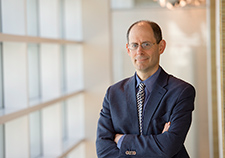Office of Research & Development |
 |
Office of Research & Development |
 |

VA Research Currents archive
March 19, 2015

Dr. Matthew Chinman, with VA and the RAND Corporation, has studied the impact of peer specialists on VA mental health care. (Photo by Bill George)
Veterans understand each other. Those years of service make more than memories and stories for the grandkids. They engender a bond, from one generation to the next: from Veteran to Veteran.
So it should come as no surprise when Dr. Matthew Chinman, a research scientist at the Pittsburgh VA Healthcare System, talks about what happens when Veterans in VA care first meet their Veteran peer specialists:
"When two Veterans meet each other for the first time, even before the first word is spoken, it's like they're already a third down the road to having a friendship," says Chinman. "They form strong relationships quickly due to their shared histories."
Chinman, also a senior behavioral scientist with the RAND Corporation, should know. He's authored several studies on the role and effectiveness of peer specialists for Veterans with serious mental illnesses and is a strong advocate for the program. His most recent research on the topic, which gauged how effective peer specialists were within VA, was published in The Journal of Behavioral Health Services & Research in January 2015.
"One of the biggest problems with serious mental illness is the future looks bleak. Peer specialists, because they've been there and done that, can serve as a bulwark against that type of thinking," says Chinman. "They're proof that people do recover. Mental illness is something that can be treated very successfully. Their very presence is a beacon of hope for the patient."
Chinman isn't alone in his view. Nationwide the hiring of peer support specialists is on the rise, not only for mental illness, but for addiction treatment as well. Nowhere is that more apparent than in VA. Already VA employs about 1,000 peer specialists across the country, making it quite likely the largest single employer of mental health peer specialists in the world.
Officially, their roles aren't too different from those of a traditional case manager: They help patients navigate their mental health illnesses, manage logistics like finding a home to rent or a job, and encourage positive behavior. Unlike case managers, however, peer specialists are free from much of the administrative burden associated with patients. As a result, they have more time to build individual relationships with them.
"Unfortunately," says Chinman, "people with mental illness have fractured relationships with their friends and families. It's difficult to recover when you have a sparse social network, and peer specialists can provide that."
Peer specialists can also draw on their own experiences to help Veterans with mental illness navigate through the sometimes-challenging VA system, drawing on their own experiences.
"What we see is a liaising between formal treatment and the patient. With mental health, there are a lot of opportunities for misunderstanding, both when the treatment team communicates with the patient, and vice versa. Peer specialists can translate for both sides," says Chinman.
Not all past studies show positive results. While many show greater patient benefits, others suggest only marginal improvements. And the positive results do not appear consistently in any one area.
One reason for the inconsistent results, Chinman suggests, is that most prior studies failed to control for implementation barriers. "Psychiatrists, clinicians, social workers—they all have specific feelings and hesitancies about peer specialists. Often times they don't understand the role or the research behind peer specialists. Position descriptions aren't always written correctly. Roles need to be defined and understood, and there needs to be advanced preparation," says Chinman. "A lot of peer specialists are new to the helping field, and like any new person who is hired, they need support and training."
For his latest study, Chinman compared outcomes between 149 Veterans who were assigned peer specialists and 133 who were not. All the Veterans had substantial psychiatric inpatient history and a primary psychiatric disorder. Before and after the peer specialists began, patients were surveyed on their recovery, quality of life, activation, interpersonal relations, and symptoms.
After one year, Chinman found the two groups were still nearly identical in most categories except for one: patient activation. The improvement was small, but other research has shown that even one point improvement in activation rating can boost recovery rates.
"With mental health treatment, over time patients can become passive. Part of that is because treatment teams sometimes don't listen as well as they might. It's almost like a learned helplessness, and patients who don't actively take part in their care or take responsibility for it don't recover as fully or as quickly," says Chinman. "Peer specialists can affect that. They can advocate for the Veterans. They can train Veterans. For example, they can role-play with them so the patients are prepared to speak to their psychiatrist when the time comes."
Chinman is also quick to point out that many of the patients in the peer specialist group were able to meet with their peer specialist only a few times over the study period, suggesting a need for VA to hire more peer specialists, which it is already doing, and to better prepare those who are hired.
"Even though VA has over 1,000 peer specialists," says Chinman, "there are still a ton of places where there could be peers and there aren't. This is a skillset and a field that is growing and it will improve over time as facilities and teams become accustomed to working alongside peer specialists. In the meantime, they need the same supervision, preparation, and opportunities that you would afford any new employee. There needs to be a plan in place so that these people can do their jobs."